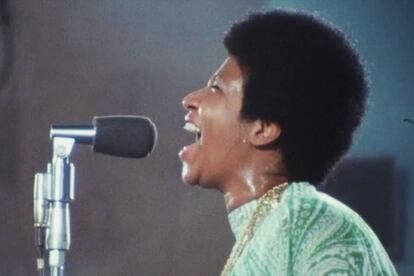Did God create Aretha Franklin?
The artist used her incredible voice to sing gospel in 1972. The sessions recorded in a local church led to the release her best-selling album ‘Amazing Grace’ and a movie that did not see the light until 2018

It was not her usual repertoire, but she gave the performance of her life. In January 1972, Aretha Franklin was 29 and already a star when she decided to go back to her roots and the gospel music she was brought up on in Detroit by her parents, Baptist pastor and civil rights activist C.L. Franklin and singer and pianist Barbara Siggers Franklin. Aretha returned despite childhood trauma: her mother left home when Aretha was six and died when she was 10; her father had got a teenager pregnant and Aretha herself became a mother before she was 13 and again at 14. But motherhood did not stand in the way of a career that began with African-American gospel songs and ended with her coronation as the queen of soul.
Just after she appeared to have peaked with the 1967 album I Never Loved A Man The Way I Love You, she organized two memorable sessions at the New Temple Missionary Baptist Church, in the Watts neighborhood, in South Los Angeles, a venue for about 150 people. Aretha was accompanied by the reverend and fellow gospel figure James Cleveland, as well as her band and the Southern California Community Choir. The sessions would be recorded for an album and a film to be directed by Sydney Pollack.
The album was released in June 1972 to become the best-selling album of her career in the U.S., though some say her 1985 Who’s Zoomin’ Who? beats it globally. But due to problems in the recording and the artist’s personal objections, the movie did not see the light until 2018, almost half a century later, once both Aretha Franklin and Sydney Pollack were dead. Producer Alan Elliott had managed to synchronize image and sound, which Pollack could not as he was unaccustomed to filming music; Franklin’s heirs gave the go-ahead after years of the movie being blocked by Aretha for reasons supposed to be economic. The result is Amazing Grace, a film that occupies a prominent place in music history and is available for streaming in the U.S. on Amazon Prime Video and Hulu.
It is an austere recording with an equally austere backdrop, but in which every note is pure and sung in a magical atmosphere that approaches ecstasy. It was January and, judging by the prevalence of heavy coats, it must have been cold outside, but inside the temperature was rising. Aretha Franklin literally sweats as she sings her heart out, gives it her all and makes the most of the voice that Rolling Stone chose as the best in the history of popular music. The movie reflects the simplicity of that concert: for example, the moment Aretha asks to go back to the start of Climbing Higher Mountains has not been cut.
Two sessions were filmed at the Baptist church: the audience consisted mostly of parishioners but also Aretha’s fans, including Mick Jagger and Charlie Watts from the Rolling Stones. In the second take, Aretha’s father steps in to make a brief speech, praising his daughter’s talent and her faith in equal measure. Mr. Franklin arrived with his girlfriend, another gospel star named Clara Ward who was an influence on Aretha. There are close-ups in which Aretha looks serious and focused. She hardly opens her mouth except to sing to an audience that participates energetically with clapping, choruses and dancing. There are very spontaneous signs of emotion: one of the women in the choir bursts into tears; the choir conductor’s enthusiasm is contagious.
Aretha Frankin’s tremendous vocal mastery and charisma do not distract from the fact that this is a religious service for true believers, as the reverend reminds us at the beginning. The lyrics of the selected songs, some traditional, others by Carole King and Marvin Gaye, speak of a Christianity that brings a sense of community and hope to humble people. The strength of this religion, which explains its resistance, is in neighborhood parishes like this one.
Religious scholar Karen Armstrong believes that religion is an art form: “Like the best art, religion gives us a chance to escape the horror that surrounds us and seek meaning in our lives,” she says. Music is the most spiritual of the arts: it is difficult to rationalize and is felt instinctively, even though it can be put into scores and measured by mathematics. If you believe in God, thank him for creating Aretha Franklin. If not, at least know that there was something divine in that temple.
Sign up for our weekly newsletter to get more English-language news coverage from EL PAÍS USA Edition
Tu suscripción se está usando en otro dispositivo
¿Quieres añadir otro usuario a tu suscripción?
Si continúas leyendo en este dispositivo, no se podrá leer en el otro.
FlechaTu suscripción se está usando en otro dispositivo y solo puedes acceder a EL PAÍS desde un dispositivo a la vez.
Si quieres compartir tu cuenta, cambia tu suscripción a la modalidad Premium, así podrás añadir otro usuario. Cada uno accederá con su propia cuenta de email, lo que os permitirá personalizar vuestra experiencia en EL PAÍS.
¿Tienes una suscripción de empresa? Accede aquí para contratar más cuentas.
En el caso de no saber quién está usando tu cuenta, te recomendamos cambiar tu contraseña aquí.
Si decides continuar compartiendo tu cuenta, este mensaje se mostrará en tu dispositivo y en el de la otra persona que está usando tu cuenta de forma indefinida, afectando a tu experiencia de lectura. Puedes consultar aquí los términos y condiciones de la suscripción digital.









































